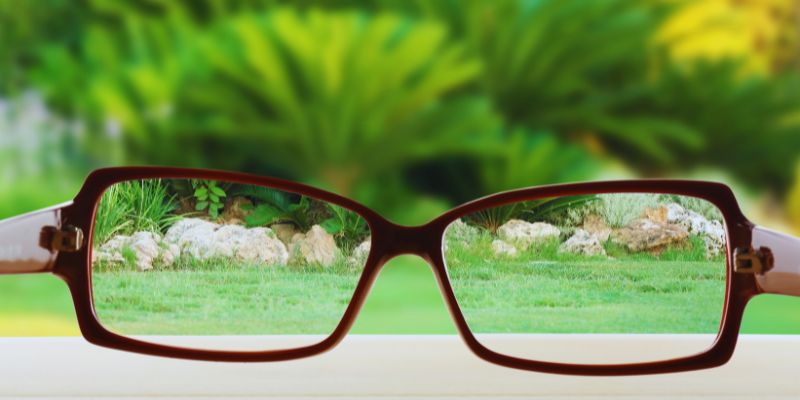How To Maintain Vision As You Age: Key Practices For Clear Sight
Have you ever noticed that people's vision is less sharp as they age? Though it is a common problem, many don't realize there are ways to protect vision. As you age, your eyes undergo natural changes, making it harder to see clearly. Therefore, older adults experience blurry vision, difficulty seeing at night, or eye discomfort. Some even develop serious conditions like cataracts or macular degeneration.
All of these problems can lead to permanent vision loss. Aging is unavoidable, but you can avoid vision loss. However, it is important to understand the cause of vision problems in order to maintain vision. Therefore, today, we will discuss all the causes of vision loss and how small lifestyle changes, like eating the right food and protecting your eyes from harmful UV rays, can help you maintain your vision. So, let's get into the details!

Common Causes Of Vision-Related Problems As You Age
The first step to maintaining your vision in old age is understanding the causes of vision problems. Here are some common causes of vision-related issues as we age:
- Eye Floaters: Eye floaters are small spots that move across your vision. They happen when the gel-like substance inside your eye, called vitreous, becomes more watery with age. It makes tiny fibers inside the eye stick together and creates shadows that people see as floaters.
- Dry Eyes: In older adults, eyes produce fewer tears, leading to dryness. Due to less moisture, the vision becomes blurry, and the eyes become more sensitive to light. Dry eyes can also cause other problems, like stinging, itching, or a burning feeling.
- Cataracts: Cataracts happen when the proteins in your eye break down over time. It creates cloudy spots on the lens. These patches can block light from reaching the retina. At first, cataracts will not affect your vision, but as they grow, they can blur your vision.
- Glaucoma: Glaucoma occurs when the fluid balance in your eye changes, increasing the pressure inside. If this pressure gets too high, it can harm the optic nerve and cause permanent vision loss. That's why it is important to treat it immediately. Glaucoma usually starts with blurry vision or trouble seeing from the sides. People with diabetes or a family history of glaucoma are at a higher risk.
- Retinal Disorders: Retinal disorders affect the thin layer at the back of the eye called the retina, which sends images to the brain. The most common retinal condition is age-related macular degeneration (AMD), a leading cause of vision loss in people over 50.
How Do You Maintain Vision As You Age?
Here is how you can maintain vision as you age:
Make Sure To Eat Healthy
Eating nutrient-rich foods is important to maintain good eye health. People should eat right to prevent age-related vision problems like macular degeneration and cataracts. Important nutrients like omega-3 fatty acids, zinc, vitamins C and E, and lutein help protect your eyes from damage. If your diet is healthy, your eyes will function properly even in old age. To support your vision, include a variety of healthy foods in your diet:
- Leafy greens like spinach, kale, and romaine lettuce
- Cruciferous vegetables like broccoli and Brussels sprouts
- Oily fish like salmon, tuna, and sardines
- Colorful vegetables like sweet potatoes, carrots, and red peppers
- Protein-rich foods, including eggs, nuts, beans, and lentils
- Citrus fruits like oranges, grapefruit, and kiwi
- Zinc sources like chickpeas, oysters, and yogurt
Exercise Is Important For Your Eye Health
To keep your eyes healthy, get 150 minutes of exercise each week. You don't have to do it all at once. Break it into 30-minute sessions five days a week, which works well for many people. Any activity that keeps you moving counts, whether a brisk walk, a workout class, or even yard work like raking leaves. Regular exercise helps improve blood flow, which benefits your eyes and overall health. You should find a routine that fits your schedule and keeps you active to support your vision and well-being. According to the research, regular activity supports tissue healing and reduces oxidative stress. Staying active also helps you maintain a healthy weight, which is important for eye health. Extra weight can cause inflammation, increasing the risk of cataracts, macular degeneration, and glaucoma. Obesity also raises the risk of type 2 diabetes, a major cause of blindness. You can start small if 150 minutes of exercise a week feels too much.
Quit Smoking To Protect Your Eyes
Smoking increases the risk of eye-related problems like cataracts, optic nerve damage, and macular degeneration. It also causes many other health problems. It is important to quit smoking, although it can be tough, especially if you have tried before and started again. Nicotine is the main chemical in tobacco. It tricks your brain into craving more, making it hard to stop. After quitting, cravings can last for weeks, causing irritation and sleep issues. Smoking is a part of your daily routine for a lot of people. However, if you want to maintain your visions as you age, consider replacing them with healthy habits. When you feel the urge, try texting a friend, listening to music, or taking a short walk. If quitting feels difficult, don't get discouraged because it mostly takes more than one try. Asking a doctor for advice can make a big difference. Even a few simple tips from them can improve your chances of quitting for good and protecting your vision.
Wear Sunglasses to Protect Your Eyes
Wearing the right sunglasses helps shield your eyes from the sun's harmful UV rays. It can lead to problems like cataracts and macular degeneration. Even cloudy days, UV rays can still pass through, so eye protection is important. When choosing sunglasses, look for ones that can block 100% of UV rays, provide protection against both UV-A and UV-B rays, and offer UV400 protection. Wraparound sunglasses offer extra protection by covering the sides of your eyes. Polarized lenses don't block UV rays but reduce glare from surfaces like water, snow, and roads. Investing in good-quality shades helps keep your eyes safe from long-term damage. Wearing sunglasses is a daily habit that safeguards your vision as you age.
Conclusion:
Aging can bring many changes to your eyesight. Taking care of your eyes can help you maintain good vision for years. Simple habits like eating a balanced diet, exercising regularly, quitting smoking, and wearing sunglasses greatly help. You can reduce your risk of serious conditions by staying aware of common vision problems and taking preventive measures. Regular eye check-ups are also important to detect issues early and get the right treatment.













